May 28, 2025 | 14:47 GMT +7
May 28, 2025 | 14:47 GMT +7
Hotline: 0913.378.918
May 28, 2025 | 14:47 GMT +7
Hotline: 0913.378.918
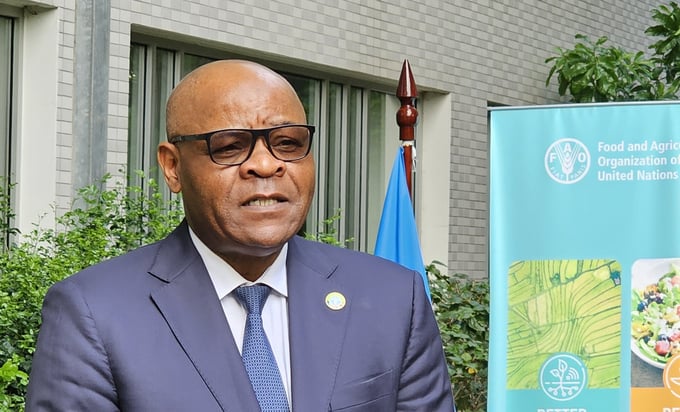
Mr. Rémi Nono Womdim, the Food and Agriculture Organization of the United Nations' (FAO) Representative to Vietnam. Photo: Bao Thang.
This year's theme revolves around plant health, safe trade, and digital technology. Could you share why FAO chose this theme and the intersection between these three factors in agricultural development?
Thank you very much for giving me this opportunity to share this report with you regarding the International Day of Plant Health.
First of all, it's important to note that plants provide 80% of the food that we eat. Plants also provide 98% of the oxygen that we breathe. Annually, at the global level, FAO estimates that the economic loss due to pests, plant pests and diseases, amounts to about 220 billion USD.
The spread of diseases is closely related to the Earth warming up gradually, creating new breeding grounds for pests and facilitating their spread. Additionally, the indiscriminate use of pesticides sometimes lacks control, harming pollinators, natural enemies, and other important organisms.
Protecting crop health is essential by promoting environmentally friendly activities such as integrated pest management (IPM). International standards for plant quarantine in trade also help prevent the invasion and spread of pests across borders.
Globally and annually, there are about 240 million of containers that are used to store food. That travel between countries. And then, in many of these containers, we have plant wood, wood material, that actually contributes to the dissemination of pests and diseases.
So, this year's theme for the International Day of Plant Health is about raising awareness on the importance of promoting plant health for food security, nutrition security, safe trade, and then as well as digital technology, to address the pressing issues of plant pests and diseases.
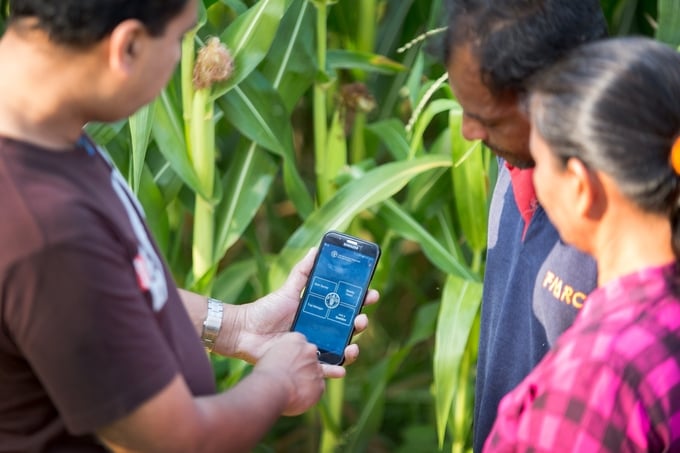
FAO has engaged in a series of activities to promote digitalization in agricultural production across several countries around the world. Photo: FAO.
Since 2021, with support from FAO, Vietnam has developed a comprehensive plan for Integrated Plant Health Management (IPHM) to address issues related to pests, the environment, and human health. After nearly 3 years of implementation, could you share the difficulties in accessing technology resources to ensure plant health? Based on that, what suggestions do you have to promote the transformation of Vietnam's food system based on improving plant health?
That's a very challenging topic. So, before addressing specific question, I would like to put it in context. The government, through the Ministry of Agriculture, Rural Development, and FAO, has formulated the Country Programming Framework for the period 2022–2026,. This Country Programming Framework, in short, CPF, contributes to the National Strategy on Sustainable Agriculture and Rural Development 2021-2030, with a vision to 2050, as well as to the National Action Plan on Food System transformation that was adopted by the Prime Minister's Office on March 28, 2023.
The CPF is articulated around four pillars. The first pillar is One health. The second is Climate Change Response, Environment, and Natural Resource Management. The third is Food Safety, Sustainable Production and Consumption, and Equitable Livelihood for All. And then the fourth pillar is Food Safety, Sustainable Production and Consumption, and Equitable Livelihood for All. The fifth pillar is a cross-cutting one on governments, gender, and persons with disabilities.
Coming back to your question regarding the support provided for the Strategic on Plant Health, it falls under the first pillar of the CPF, which is the One Health. So, Plant Health belongs to the One Health, and is really a very key component for food system transformation in Vietnam. What are the challenges that we are facing? You know, food system transformation is a dynamic process. Things evolve very, very quickly.
You addressed this disease today, tomorrow there will be a new disease. So, the institutions, the resource persons, they have to be ready at any time. So, the challenge is to make sure that key institutions and key resource people working to ensure plant health are very aware of the new global developments. Because countries do not only share common borders but also share common plant health and disease problems.
So, regarding, as I said, and then I think I'll start answering the second question, what will be the contribution to food system transformation?
Again, as I said, the One Health component, plant health being a component of the One Health, is already an integrated part of the national action plan on food system transformation in Vietnam. And then, if we're going to continue to support the government in its effort to transform the agri-food system,.

FAO supports Vietnam in the implementation of IPHM scheme and the upcoming 1 million ha of high-quality and low carbon rice in Mekong Delta. Photo: TL.
Recently, Vietnam has vigorously implemented sustainable food transformation, such as the implementation of the 1 million hectares high-quality rice project, reducing emissions in the Mekong Delta. As the main sponsor of some IPHM projects in Vietnam, what activities and technical support will FAO deploy next to align with Vietnam's current situation?
The 1 million low-carbon rice scheme is still a part of the overall national action plan on food system transformation. FAO, since the beginning, has been providing technical support in the formulation of this scheme. We are going to continue to support the government and other key stakeholders for the implementation of this very important scheme.
Because the overall goal is to ensure that, you know, agriculture, to reduce the carbon footprint in agriculture. According to a report by the World Bank, agriculture contributes to up to about 20% of greenhouse gas emissions in Vietnam.
Rice alone is a major contributor to these greenhouse gas emissions. And that is why FAO is supporting us with the development of tools like we have developed a tool for measuring, reporting, and verification to measure methane emissions in rice production. We are going also to continue to support data generation and then help the policymaker make an informed and insightful decision.
And then, of course, one important thing when we are talking of 1 million hectares of rice, it's important to bring in technologies, and innovation, but most importantly, it's also important to support the government in mobilizing the financial resources public, private, blended finance for the implementation of this scheme. And then finally, partnership. The partnership will be key.
So FAO is also supporting the effort of the government to build strategic partnerships, north-south, south-south, and triangular cooperation, and most importantly, engagement with the private sector. This will be really a key to successfully achieving the 1 million low-carbon rice scheme in Vietnam.
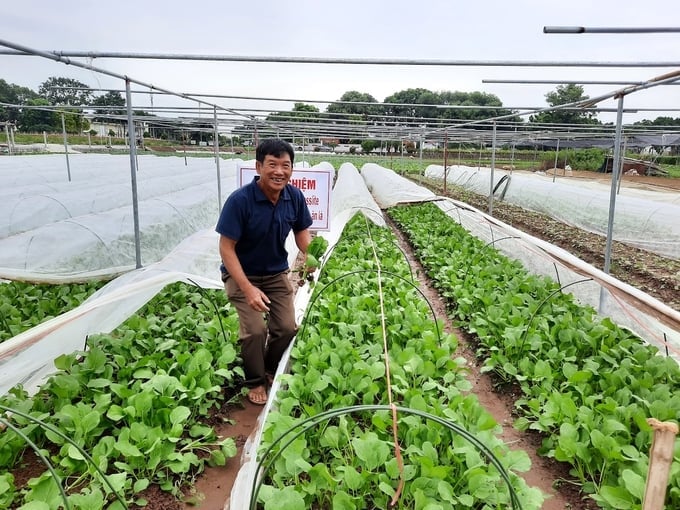
Improving plant health contributes to the sustainable development of agriculture. Photo: TL.
In 2024, Vietnam's National Committee on Digital Transformation has chosen digital economic development as its theme. For agriculture, the digital economy mainly focuses on e-commerce. What advice do you have for Vietnam to develop e-commerce while ensuring safe trade?
When we talk about agri-food system transformation, and I think I indicated it earlier during this conversation, it's a dynamic process.
I will not go very far, you know, renovation policies of agriculture in Vietnam. And that has led to the significant improvement of the agri-food system sector in Vietnam.
That was mainly due to the introduction of improved technology like high-healing varieties, you know, irrigation, fertilizer, and so on. So coming to your question, digitalization is key to accelerated food system transformation in Vietnam.
And digitalization is not only about e-commerce. We know today that, for instance, we have autonomous machinery that can provide fertilizer in the fields. We have drones that can provide fertilizer in the fields. Coming to your specific question, regarding safe trade, as I indicated earlier, annually, over 240 million containers travel between countries, and then with the risk of disseminating pests and diseases. One tool to prevent the dissemination of diseases will be, for instance, an e-phytosanitary certificate. So you see, these are one of the concrete examples where digitalization could be used, you know, to guarantee safe trade between countries.
Thank you!
The United Nations designates as International Plant Health Day on May 12 every year, to raise global awareness that protecting plant health can help end hunger, alleviate poverty, safeguard biodiversity and the environment, as well as promote economic development.
Translated by Linh Linh
/2025/05/27/4731-2-223159_980.jpg)
(VAN) No votive paper, no styrofoam, no plastic bags, no plastic bottles, and no single-use plastic trays are the key rules tourists should keep in mind when visiting Con Dao.

(VAN) In the fight against plastic pollution, Vietnam has been demonstrating a proactive, pioneering, and active role in addressing the greatest environmental challenge today.
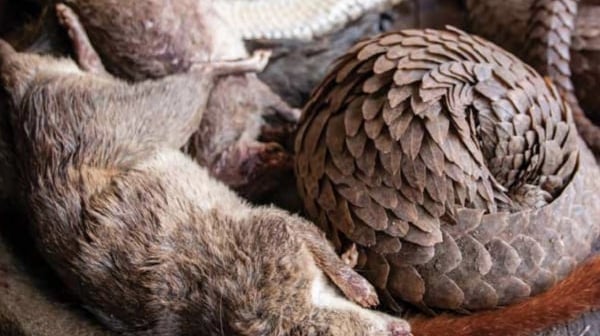
(VAN) The WOAH guidelines provide a vital tool for risk chain analysis, covering the extraction, transportation, consumption, and handling of confiscated wildlife.
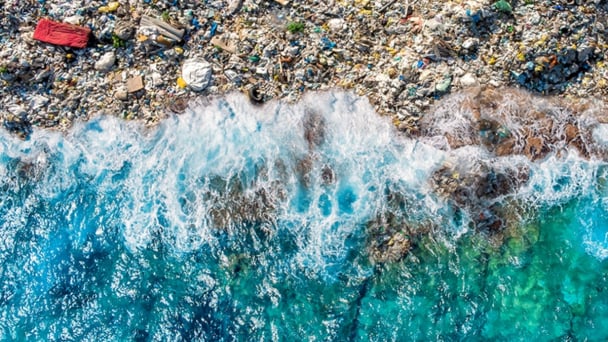
(VAN) World Environment Day 2025 is launched by the United Nations Environment Programme (UNEP) with the theme 'Beat Plastic Pollution'.
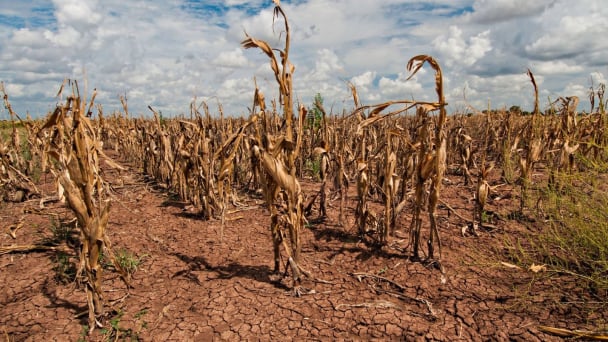
(VAN) As climate whiplash reshapes yields, experts say data-driven tools and targeted relief are critical to feed America.
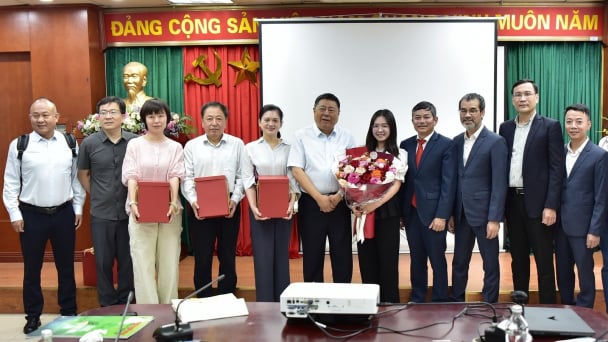
(VAN) The alignment in goals and operational direction between the Vietnam Agriculture and Nature Newspaper and Shaanxi Daily opens up promising prospects for journalism and media cooperation.
/2025/05/26/3422-3-102748_432.jpg)
(VAN) Prime Minister Pham Minh Chinh has been honored as the Distinguished ASEAN Leader at the ASEAN Leadership and Partnership Forum (ALPF) 2025 held in Malaysia, affirming Vietnam’s role and reputation.